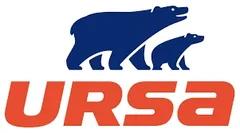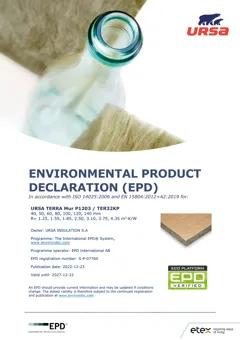

Other manufacturers with similar products
EPD: Glass wool insulation, faced, L = 0.032 W/mK, R = 1.25 m2K/W, 40 mm, 1.235 kg/m2, 29 kg/m3, TERRA Mur P1203, TER32KP, URSA INSULATION S.A
Experience superior thermal comfort and energy efficiency with TERRA Mur P1203, TER32KP. This faced glass wool insulation combines high performance with easy installation, making it the ideal choice for residential and commercial applications.
Glass wool insulation, faced, offers excellent thermal performance, sound absorption, and fire resistance. It comes in flexible panels that are easy to handle and install, providing a seamless finish and enhanced aesthetics in buildings.
TERRA Mur P1203, TER...
Manufacturer:
URSA INSULATION S.A
Group:
Country of production:
Product name:
Glass wool insulation, faced
Commercial names:
TERRA Mur P1203, TER32KP
Category:
Insulation
Class:
Glass wool insulation
Type:
Glass wool faced
Environmental impacts
Global Warming Potential (A1-A3):
2.21 kg CO2e/m²
Technical specification:
L = 0.032 W/mK, R = 1.25 m²K/W, 40 mm, 1.235 kg/m², 29 kg/m³
Available units for calculation:
m², kg, ton, m³
Unique identifier (OCLID):
648f4668faaf573bcf2dc488
Sustainability data background information
EPD number:
S-P-07760
EPD program:
International EPD System
Publication year:
2022
Product Category Rules (PCR):
PCR 2019:14. Construction products (EN 15804+A2) Version 1.11. C-PCR-005 Thermal insulation products (EN 16783:2017) Version: 2019- 12-20
Environmental standard:
EN15804+A2
Data source:
EPD URSA TERRA Mur P1203 / TER32KP 40, 50, 60, 80, 100, 120, 140 mm R= 1.25, 1.55, 1.85, 2.50, 3.10, 3.75, 4.35 m2·K/W Owner: URSA INSULATION S.A
Verification status:
Third-party verified (as per ISO 14025)
Upstream database:
ecoinvent



